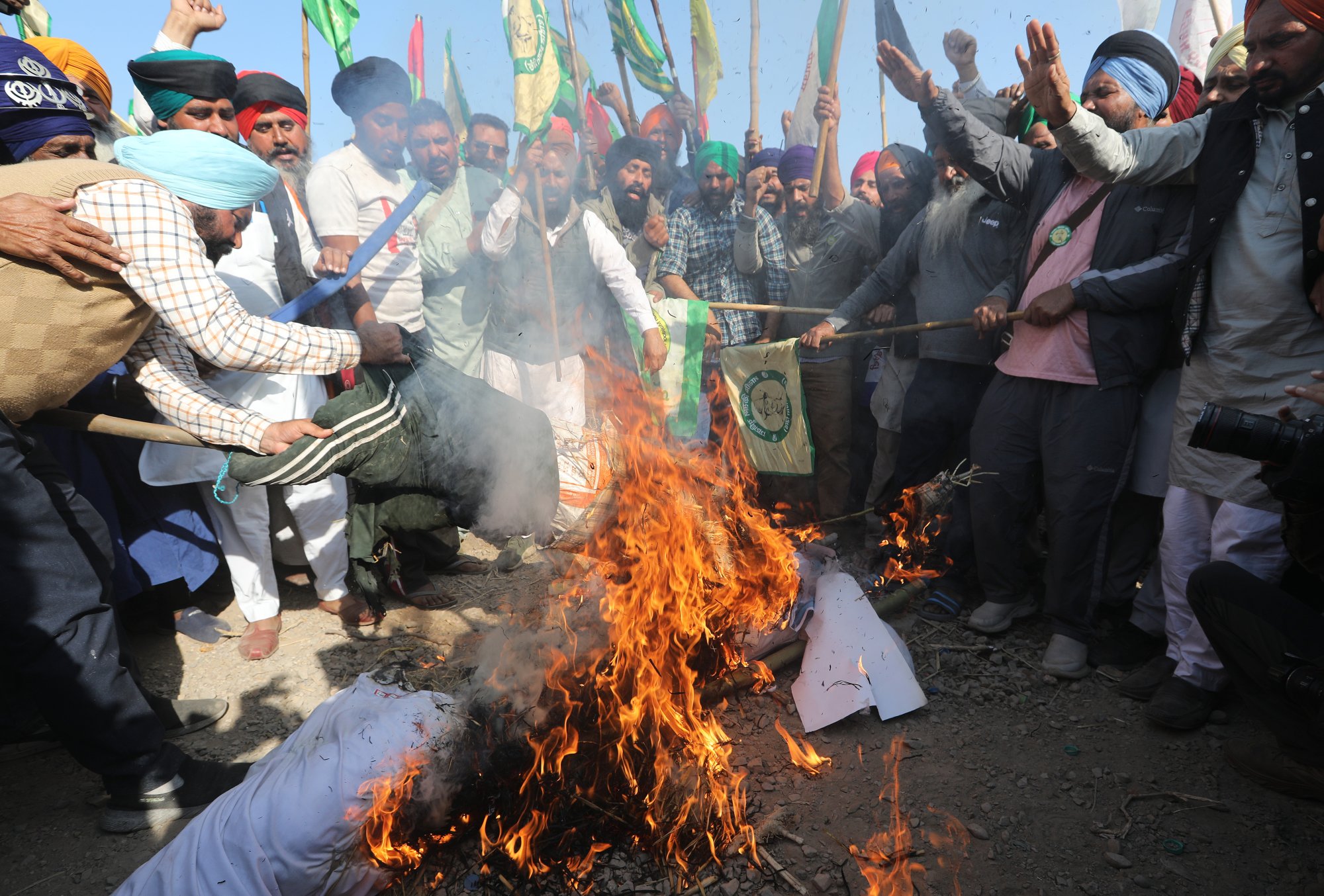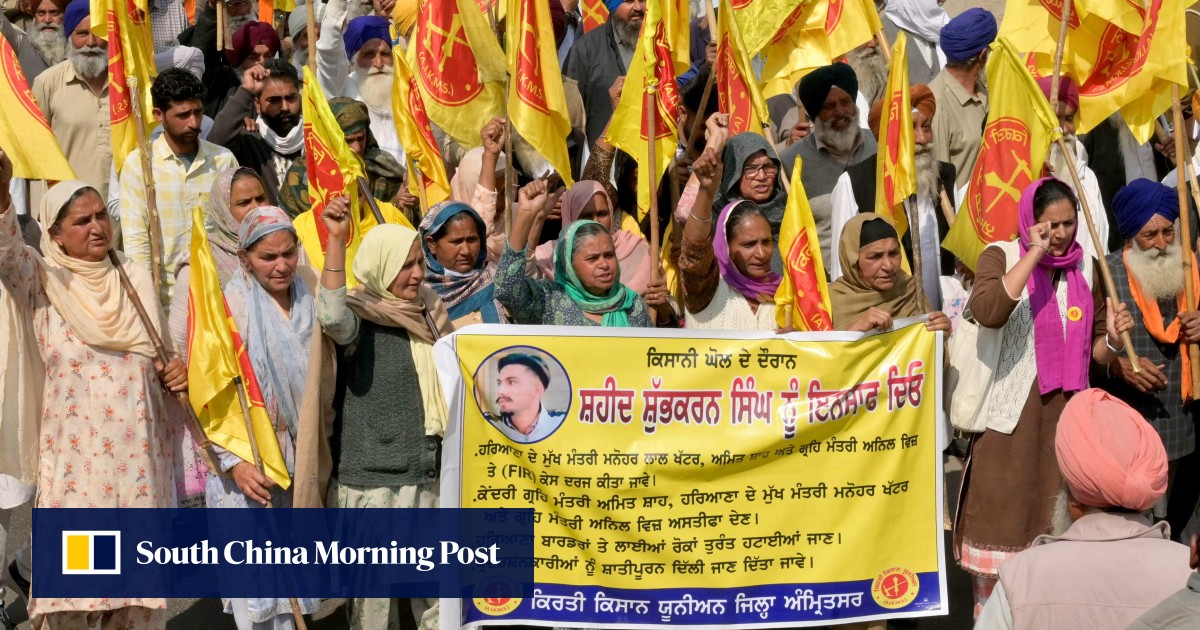The protest was sparked by the death of 21-year-old farmer Shubhkaran Singh, who was killed near Khanauri, a town in the state of Punjab, allegedly during clashes with the police on February 21. Twelve security personnel were also reportedly injured in the clashes.
Indian farmers vow to march on even as police allegedly fire pellet guns
Indian farmers vow to march on even as police allegedly fire pellet guns
The march came to a halt at the village of Shambhu, near Haryana, about 125 miles (201 km) away from the capital, as a large police contingent used tear gas, rubber bullets, and what protesters described as pellet guns.
Indian authorities have locked down New Delhi amid the violent clashes, the latest of which took place after the government and the farmers’ union failed to reach an agreement.
The main opposition Congress Party said the Haryana police’s threats raised concerns about India’s tilt towards authoritarianism.
“Have we become a fascist state that if you protest your passports and visas will be cancelled? This is a first even by the very low bar that has been set to intimidate farmers,” Manish Tewari, a senior Congress leader and member of parliament, wrote on X, formerly known as Twitter.
“Those subjected to this coercive action are free to contact me. Our Law Chambers will fight for them pro-bono.”
Modi-backed Article 370 film rankles as political jousting moves to cinema
Modi-backed Article 370 film rankles as political jousting moves to cinema
Senior Supreme Court lawyer and human rights activist Vrinda Grover told This Week in Asia that the Haryana police do not have the legal right to rescind people’s passports.
“There is a passport authority and the Passport Act, and I don’t think that Haryana police has been authorised under it to suspend anyone’s passport. They need to first establish the case against the people they are planning to impound the passport. Are they planning to run away from the country? What is the case?” Grover said.
The authorities are free to write to any embassy for visa cancellation, according to Grover.
“But what the police are saying is not in accordance with the law. The visa could only be cancelled by the country granting that visa. I don’t know how the Haryana police can decide it. The Haryana police should read up on the law a little bit,” she added.
Anuj Kumar Singh, one of the protest leaders and the youth state president of Bharatiya Kisan Union (BKU) in Uttar Pradesh, described the threat of passport seizure as another attempt by the government to “erode the democratic values of the country”.
“Earlier, they [authorities] tried to slap NSA [National Security Act] on farmers leaders and now they are planning to impound our passports and visas. It seems that the Haryana government is working as a B-team of the BJP [Bharatiya Janata Party] government at the centre,” Singh said, adding that they would challenge any such attempt to seize the protestors’ passports in court.
Haryana police announced on February 23 that they would seize the assets of protesting farmers who caused any damage to public property under the NSA. However, the police reversed their decision hours after the announcement.
Professor Ronki Ram, who teaches political science at Punjab University, told This Week in Asia that the government should initiate dialogue with the protesters instead of worsening the situation.
“At this moment, the focus should be on resolving the issue through political consultation and understanding the farmers’ concerns. Taking harsh actions such as cancelling their passports will only make the farmers more stubborn.”
Ram said that farmers are ready for negotiations but “dictating terms” to them will not bear any fruits.
“You have to understand the psyche of the Punjabi people. Farmers are ready for talks but if you try to impose things on them, it will only aggravate the situation. [Punjabis] don’t like dictates,” he said.

Considering the duration of similar protests in 2020 and 2021, the current group of protesting farmers are unlikely to give up without their demands being met, Ram said.
“Initially, there wasn’t much unity among the farmers but now more are joining the protest. I hope that better sense prevails, and the government resolves the issue amicably.”
Indian farmers are an influential voting bloc, especially for Modi’s support base. Modi’s BJP rules states including Haryana that have a substantial farming population.
Google AI’s answer on whether Modi is ‘fascist’ sparks outrage in India
Google AI’s answer on whether Modi is ‘fascist’ sparks outrage in India
Lucky Sharma, a farmer from the village of Rajpora in Punjab, said that around 400 farmers from Haryana have been involved in the protest so far.
“We heard that the Haryana government has announced plans to cancel the passports of protesting farmers. However, we will not bow down to such tactical pressures from the authorities. Regardless of what they do, we are not going anywhere,” he said.
Sharma said they performed the last rites for Shubhkaran Singh on Thursday after an official report was filed to initiate an investigation into the alleged involvement of the Haryana police in the farmer’s death.
“Today, our leaders were occupied with the cremation process. We had suspended the protest until February 29 following the farmer’s demise,” Sharma said.


